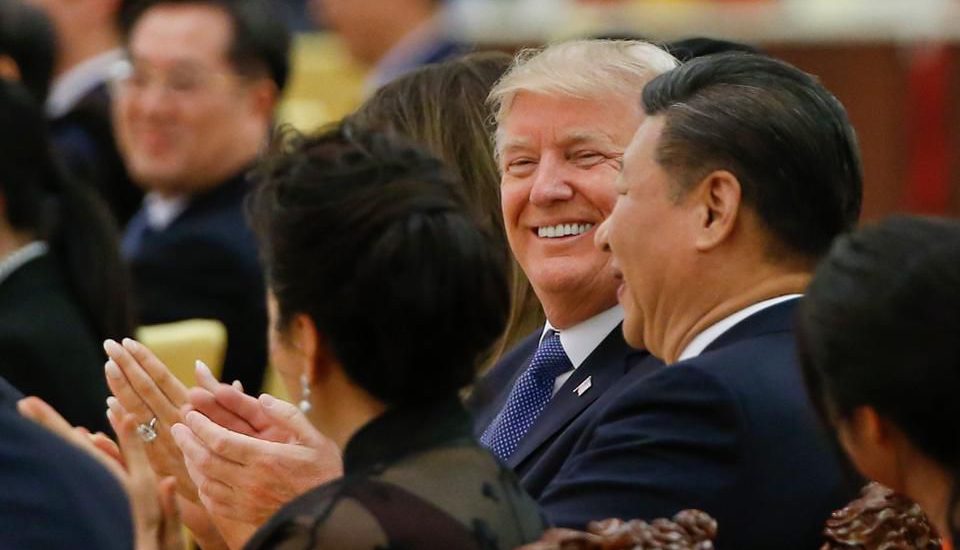Trump Vs. China: Is A Trade War On The Way? Jan 24, 2018

Jan 24, 2018 @ 02:55 PM 5,298
Trump Vs. China: Is A Trade War On The Way?
John Brinkley , Contributor I write about international trade and investment. Opinions expressed by Forbes Contributors are their own.
Since China joined the World Trade Organization in 2001, it has been the most frequent target of U.S. trade enforcement actions, but President Trump seems intent on making a full-bore, frontal assault.
His decision this week to impose punitive 30% tariffs on solar panel imports was the opening shot in what could turn into a trade war. The tariff isn’t specifically targeted at China, but that’s where most imported solar panels come from.
U.S. President Donald Trump and China’s President Xi Jinping attend at a state dinner at the Great Hall of the People in Beijing, China, Thursday, Nov. 9, 2017. (Thomas Peter/Pool Photo via AP)
Trump has two other decisions to make about trade with China – one having to do with intellectual property theft, the other with steel and aluminum imports.
Trump seems indifferent to the possibility of a trade war. He told Reuters last week that he didn’t want one, “but if it there is, there is.” This was in the context of the administration’s considering a “big intellectual property fine” against China for requiring American companies that operate there to transfer proprietary data to the Chinese government as a cost of doing business there.
“We’re talking about big damages,” he said. “We’re talking about numbers that you haven’t even thought about.”
Second, the Commerce Department recently sent Trump its report on whether steel and aluminum imports from China and elsewhere posed a threat to U.S. national security. Commerce didn’t say publicly what it had concluded, but given that Commerce Secretary Wilbur Ross is in Trump’s doghouse at present, it’s a good bet that his department has told Trump exactly what he wanted to hear.
Let’s look at these three cases individually.
One thing they have in common is that the Trump administration has chosen not to pursue any of them in the World Trade Organization’s Dispute Settlement Body. They are based on U.S. laws. If China challenges them in the WTO, the question will be whether the laws were applied in concert with WTO rules. If not, the WTO will allow China to respond in kind.
It is true that China is guilty of intellectual property theft on a grand scale. But a fine? It’s hard to imagine how fining the Chinese government would have any effect. It’s hard to imagine that China would even agree to pay a fine, given that it will be levied outside the auspices of the WTO. Whatever fine Trump comes up with will have no binding authority.
As for steel and aluminum imports, the administration is relying on an obscure section of the Trade Expansion Act of 1962, which allows the president to impose tariffs, quotas and other measures to keep certain imports out of the United States if the Commerce Department decides that they threaten national security.
An argument in favor of that is that defense industries use a lot of steel and aluminum and they have some political incentive to buy it from American producers if they want to keep the congressional money faucet open.
An argument against it is that a lot of other industries – like the auto industry – use steel and aluminum, too, and they have no such incentive. If Trump imposes tariffs and quotas on imported steel, the price of domestic steel will go up. Some steel-consuming industries will be unable to pay the added cost without either raising consumer prices or moving production to Mexico or both.
As for solar panels, China exported about $1.5 billion worth of them to the United States in 2016, a huge increase from the $188.9 million worth in 2007, according to the Census Bureau.
“You know, they dump them – government-subsidized, lots of things happening – they dump the panels, then everybody goes out of business,” Trump said in the Reuters interview.
Two American solar technology manufacturers, Suniva of Norcross, Ga., and SolarWorld Americas of Hillsboro, Ore., filed a complaint with the ITC last year, claiming that cheap, government-subsidized solar imports from China were destroying them. Suniva filed for bankruptcy protection just before filing the complaint. The ITC agreed and recommended tariffs of 35% on all solar imports.
Suniva and SolarWorld, U.S. subsidiaries of foreign companies, don’t have the full support of their industry. The Solar Energy Industries Association, which represents about 1,000 companies, vehemently opposes their petition. In a letter to Trump last week, SEIA President and CEO Abigail Ross Harper said, “A decision to impose high tariffs in line with the International Trade Commission’s recommendation will lead to the layoff of tens of thousands of workers, cause companies to stop investing in the United States and bring an American economic engine screeching to a halt.”
A trade war with China would have myriad unintended consequences – higher consumer prices, off-shored jobs, an increased trade deficit with China, and Chinese retaliation prime among them. It would also threaten the economic growth and bull market that Trump inherited, but claims credit for.
Will he consider these possibilities? Does he even understand them? Those who hoped that Trump’s trade ideology had evolved from its bellicose origins are likely to
